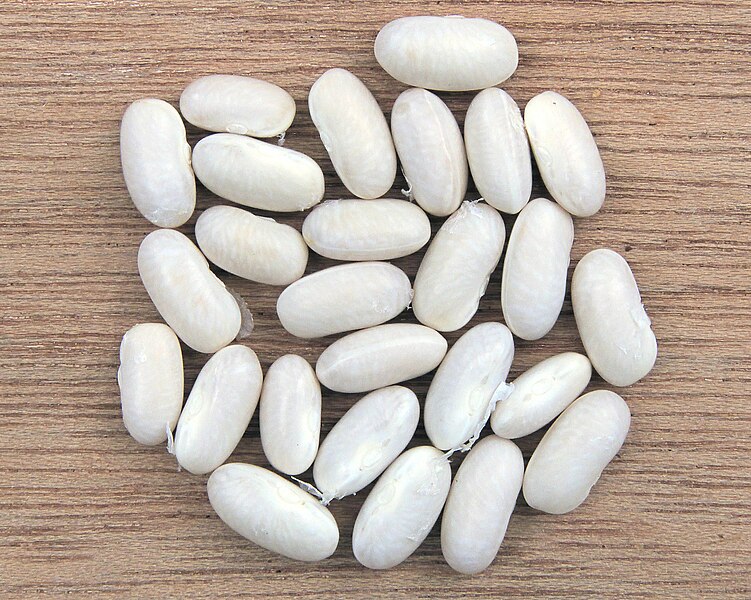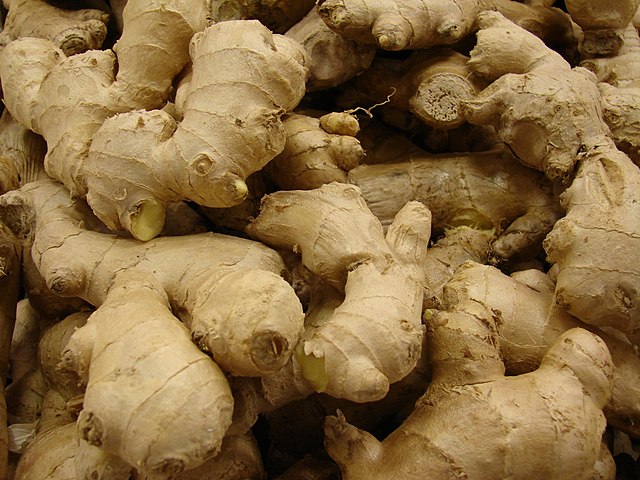White Beans vs. Ginger Root
Nutrition comparison of White Beans and Ginger Root
Ever wonder how your favorite foods stack up against each other in terms of nutrition?
We compared the nutritional contents of
white beans
versus
ginger root
(100g each)
below using 2020 USDA and NIH data[1].
For a quick recap of significant nutrients and differences in white beans and ginger root:
- Both ginger root and white beans are high in potassium.
- White bean has more thiamin and folate, however, ginger root contains more niacin.
- White bean is a great source of iron.
- White bean is an excellent source of calcium and dietary fiber.
USDA sources for nutritional information: White Beans (Beans, white, mature seeds, canned) and Ginger Root (Ginger root, raw) . Have a correction or suggestions? Shoot us an email.
Calories and Carbs
calories
White bean is high in calories and ginger root has 30% less calories than white bean - ginger root has 80 calories per 100 grams and white bean has 114 calories.
For macronutrient ratios, white beans is much heavier in protein, much lighter in carbs and similar to ginger root for fat. White beans has a macronutrient ratio of 25:73:2 and for ginger root, 0:100:0 for protein, carbohydrates and fat from calories.
Macro Ratios from Calories:
| White Beans | Ginger Root | |
|---|---|---|
| Protein | 25% | ~ |
| Carbohydrates | 73% | 100% |
| Fat | 2% | ~ |
| Alcohol | ~ | ~ |
carbohydrates
Ginger root and white beans contain similar amounts of carbs - ginger root has 17.8g of total carbs per 100 grams and white bean has 21.2g of carbohydrates.
dietary fiber
White bean is an excellent source of dietary fiber and it has 140% more dietary fiber than ginger root - ginger root has 2g of dietary fiber per 100 grams and white bean has 4.8g of dietary fiber.
sugar
Ginger root and white beans contain similar amounts of sugar - ginger root has 1.7g of sugar per 100 grams and white bean has 0.29g of sugar.
Protein
protein
White bean has 299% more protein than ginger root - ginger root has 1.8g of protein per 100 grams and white bean has 7.3g of protein.
Fat
saturated fat
Both ginger root and white beans are low in saturated fat - ginger root has 0.2g of saturated fat per 100 grams and white bean has 0.07g of saturated fat.
Vitamins
Vitamin C
Ginger root has more Vitamin C than white bean - ginger root has 5mg of Vitamin C per 100 grams and white bean does not contain significant amounts.
Vitamin E
Ginger root and white beans contain similar amounts of Vitamin E - ginger root has 0.26mg of Vitamin E per 100 grams and white bean has 0.79mg of Vitamin E.
Vitamin K
Ginger root and white beans contain similar amounts of Vitamin K - ginger root has 0.1ug of Vitamin K per 100 grams and white bean has 2.9ug of Vitamin K.
The B Vitamins
White bean has more thiamin and folate, however, ginger root contains more niacin. Both white beans and ginger root contain significant amounts of riboflavin, pantothenic acid and Vitamin B6.
| White Beans | Ginger Root | |
|---|---|---|
| Thiamin | 0.096 MG | 0.025 MG |
| Riboflavin | 0.037 MG | 0.034 MG |
| Niacin | 0.113 MG | 0.75 MG |
| Pantothenic acid | 0.185 MG | 0.203 MG |
| Vitamin B6 | 0.075 MG | 0.16 MG |
| Folate | 65 UG | 11 UG |
Minerals
calcium
White bean is an excellent source of calcium and it has 356% more calcium than ginger root - ginger root has 16mg of calcium per 100 grams and white bean has 73mg of calcium.
iron
White bean is a great source of iron and it has 398% more iron than ginger root - ginger root has 0.6mg of iron per 100 grams and white bean has 3mg of iron.
potassium
Both ginger root and white beans are high in potassium. Ginger root is very similar to ginger root for potassium - ginger root has 415mg of potassium per 100 grams and white bean has 454mg of potassium.
Omega-3 and Omega-6
omega 3s
For omega-3 fatty acids, both white beans and ginger root contain significant amounts of alpha linoleic acid (ALA).
| White Beans | Ginger Root | |
|---|---|---|
| alpha linoleic acid | 0.056 G | 0.034 G |
| Total | 0.056 G | 0.034 G |
omega 6s
Comparing omega-6 fatty acids, both white beans and ginger root contain significant amounts of linoleic acid.
| White Beans | Ginger Root | |
|---|---|---|
| linoleic acid | 0.067 G | 0.12 G |
| Total | 0.067 G | 0.12 G |
Customize your serving size
The comparison below is by common portions, e.g. cups, packages. You can also see a more concrete comparison by weight at equal weight (by grams) comparison.
Note: The specific food items compared are: White Beans (Beans, white, mature seeds, canned) and Ginger Root (Ginger root, raw) .
White Beans g
()
|
Daily Values (%) |
Ginger Root g
()
|
|||||
|---|---|---|---|---|---|---|---|
| KCAL % |
|
5% | calories | 5% |
|
KCAL % | |
| G % |
|
5% | carbohydrates | 5% |
|
G % | |
| G % |
|
5% | dietary fiber | 5% |
|
G % | |
| G | 5% | sugar | 5% | G | |||
| G % |
|
5% | total fat | 5% |
|
G % | |
| G % |
|
5% | saturated fat | 5% |
|
G % | |
| G | 5% | monounsaturated fat | 5% | G | |||
| G | 5% | polyunsaturated fat | 5% | G | |||
| G | 5% | trans fat | 5% | G | |||
| MG | 5% | cholesterol | 5% | MG | |||
| MG % |
|
5% | sodium | 5% |
|
MG % | |
| 5% | Vitamins and Minerals | 5% | |||||
| UG % |
|
5% | Vitamin A | 5% |
|
UG % | |
| MG % |
|
5% | Vitamin C | 5% |
|
MG % | |
| IU % |
|
5% | Vitamin D | 5% |
|
IU % | |
| MG % |
|
5% | calcium | 5% |
|
MG % | |
| MG % |
|
5% | iron | 5% |
|
MG % | |
| MG % |
|
5% | magnesium | 5% |
|
MG % | |
| MG % |
|
5% | potassium | 5% |
|
MG % | |
| MG % |
|
5% | thiamin (Vit B1) | 5% |
|
MG % | |
| MG % |
|
5% | riboflavin (Vit B2) | 5% |
|
MG % | |
| MG % |
|
5% | niacin (Vit B3) | 5% |
|
MG % | |
| MG % |
|
5% | Vitamin B6 | 5% |
|
MG % | |
| MG % |
|
5% | pantothenic acid (Vit B5) | 5% |
|
MG % | |
| UG % |
|
5% | folate (Vit B9) | 5% |
|
UG % | |
| UG % |
|
5% | Vitamin B12 | 5% |
|
UG % | |
| MG % |
|
5% | Vitamin E | 5% |
|
MG % | |
| UG % |
|
5% | Vitamin K | 5% |
|
UG % | |
| G % |
|
5% | protein | 5% |
|
G % | |
| UG % |
|
5% | biotin (Vit B7) | 5% |
|
UG % | |
| MG % |
|
5% | choline | 5% |
|
MG % | |
| MG % |
|
5% | chlorine | 5% |
|
MG % | |
| UG % |
|
5% | chromium | 5% |
|
UG % | |
| MG % |
|
5% | copper | 5% |
|
MG % | |
| UG % |
|
5% | fluoride | 5% |
|
UG % | |
| UG % |
|
5% | iodine | 5% |
|
UG % | |
| MG % |
|
5% | manganese | 5% |
|
MG % | |
| UG % |
|
5% | molybdenum | 5% |
|
UG % | |
| MG % |
|
5% | phosphorus | 5% |
|
MG % | |
| UG % |
|
5% | selenium | 5% |
|
UG % | |
| MG % |
|
5% | zinc | 5% |
|
MG % | |
| G | 5% | Water | 5% | G | |||
| G | 5% | Starch | 5% | G | |||
| G | 5% | Alcohol | 5% | G | |||
FAQ
Does ginger root or white beans contain more calories in 100 grams?White bean is high in calories and ginger root has 30% less calories than white bean - ginger root has 80 calories in 100g and white bean has 114 calories.
Does ginger root or white beans have more carbohydrates?
By weight, ginger root and white beans contain similar amounts of carbs - ginger root has 17.8g of carbs for 100g and white bean has 21.2g of carbohydrates.
Does ginger root or white beans contain more calcium?
White bean is a rich source of calcium and it has 360% more calcium than ginger root - ginger root has 16mg of calcium in 100 grams and white bean has 73mg of calcium.
Does ginger root or white beans contain more potassium?
Both ginger root and white beans are high in potassium. Ginger root is very similar to ginger root for potassium - ginger root has 415mg of potassium in 100 grams and white bean has 454mg of potassium.

